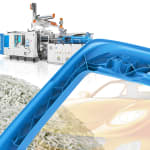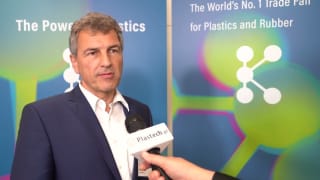
KraussMaffei has unveiled its Chopped Fiber Processing (CFP) technology, a significant advancement in the processing of fiber-reinforced thermoplastics. This new process allows for the direct compounding of polypropylene (PP) and chopped glass fibers within the injection molding cycle, eliminating the need for pre-compounded long glass fiber granulate. The CFP technology is designed to optimize material costs, enhance component properties, and provide plastics processors with greater flexibility in formulation development.
At the heart of the CFP system is a patented screw geometry, developed specifically by KraussMaffei, which ensures gentle and homogeneous mixing of PP and glass fibers. The separate dosing of both materials via the machine's conveyor system prevents the formation of fiber clusters, resulting in components with consistent mechanical properties and reduced material consumption. This approach enables manufacturers to achieve up to 30 percent cost savings and a lower product carbon footprint through inline compounding.
One of the key advantages of the CFP technology is its ability to allow processors to create and customize their own material formulations. This not only fosters in-house material expertise but also provides a competitive edge by enabling the development of application-specific solutions. The technology is compatible with KraussMaffei's existing machine series and can be retrofitted to older systems, making it accessible to a wide range of users. The company estimates a return on investment in less than 12 months, thanks to the combination of material savings and process efficiency.
Live demonstration at K 2025
Visitors to K 2025 will have the opportunity to see the CFP technology in action on a GX 650-4300 injection molding machine, equipped with the new LRXplus 350 linear robot. The demonstration will focus on the production of a complex tailgate component for the automotive industry, featuring realistic 3D geometry and high functional integration. The process delivers finished parts ready for assembly directly from the machine, without the need for additional reworking. This capability opens new possibilities for the efficient manufacture of structural, support, and reinforcement elements in various industries.

Live at K 2025: a GX 650-4300 with the new LRXplus 350 linear robot and chopped fiber plasticizing unit.
The GX 650-4300 is equipped with BluePower options, including a servo drive and insulating sleeves, which enable precise energy monitoring and efficient operation. The BluePower ecoAssistant allows the machine to switch to an energy-saving mode without compromising performance. The component is filled using a cascade system with three injection points, and the APCplus machine function introduces new features such as cascadeX for weld line-free filling and improved mechanical properties. The materialX function within APCplus uses material-specific compression curves to further enhance component precision.
Comprehensive process documentation and quality assurance
Quality control is integrated into the production process through a weigh unit in the LRXplus 350 gripper, which records the weight of each component cycle by cycle. All production and quality data are documented online, and each part receives an individual QR code. This enables processors to access quality characteristics and production data at any time, supporting robust quality assurance protocols.
The CFP technology is suitable for a wide range of applications, from automotive and aerospace to technical consumer goods. Its flexibility in producing structural and load-bearing components, combined with significant cost advantages, makes it an attractive solution for manufacturers seeking to optimize their processes and materials.
Partners supporting the K 2025 trade fair exhibit include Borealis Polyolefine GmbH (material), Siebenwurst GmbH & Co. KG (tooling), Motan GmbH (material feeding), Audia Plastics s.r.o. (color batch), and Helm AG (glass fiber).

Efficient, flexible, cost-saving: KraussMaffei's new CFP technology enables the economical direct compounding of chopped glass fibers and PP – see it live at K 2025 during the injection molding of a sophisticated tailgate component.



